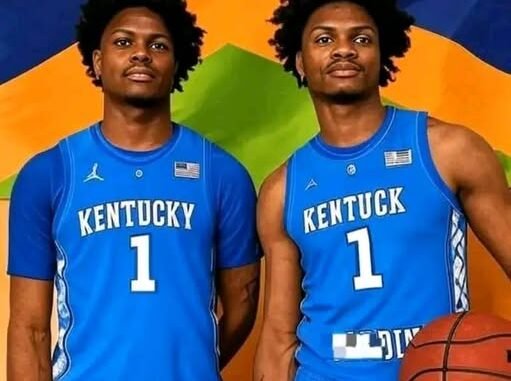
In the fast-paced, often chaotic world of college basketball recruiting, few decisions have captured the imagination of an entire fan base and redefined the trajectory of a program as profoundly as the commitment of Andrew and Aaron Harrison. On a Thursday in October 2012, live on ESPNU, the nation watched as the top-ranked twin prospects from Richmond, Texas, announced their dual decision to attend the University of Kentucky. It was a commitment that not only solidified a historic recruiting class but also ushered in an era of unprecedented expectations, a rollercoaster of emotions, and a complicated legacy that continues to be debated in the heart of the Big Blue Nation.
At the time, the Harrison twins were the most sought-after dual prospects in the country. Andrew, a top-five recruit, was a physically dominant point guard with the build of an NBA veteran and a reputation as a floor general. His twin brother, Aaron, was a lethal shooting guard, a silky-smooth scorer with a penchant for hitting clutch shots. Their collective talent was a force of nature, and their decision to commit to John Calipari’s Kentucky program, choosing the Wildcats over a host of other suitors, including their home-state schools Baylor and SMU, was a monumental win. It was a signal that the “platoon” system, which Calipari would later employ, was not just a passing fad but a legitimate, albeit radical, strategy for building a championship team.
The twins arrived in Lexington for the 2013-14 season as part of what was arguably the most talented freshman class in college basketball history, a group that included future NBA lottery picks Julius Randle and James Young. The expectations were immense. The media and fans alike believed this group of “one-and-done” superstars would not only cruise to a national title but would do so with a dominant, untouchable swagger. However, the season did not unfold as planned. The chemistry of a team loaded with so many alpha-male freshmen proved to be a challenge. The regular season was a series of highs and lows, and the team entered the NCAA tournament as a deeply flawed, No. 8 seed with more questions than answers.
And then, the magic of March took hold. With their backs against the wall, the Wildcats, led by the clutch play of the Harrison twins, embarked on one of the most improbable tournament runs in history. It was a journey of redemption, where the narrative of a struggling team was replaced by the story of a group of young men finally coming into their own. Aaron Harrison became a national icon, a cold-blooded assassin with ice in his veins. He hit a series of game-winning shots that are now etched into the lore of March Madness. The first came in the Sweet 16 against archrival Louisville, a deep, late-game three-pointer that sent the Wildcats to the Elite Eight. He followed that up with an even more dramatic shot against Michigan in the Elite Eight, a last-second three that propelled Kentucky to the Final Four. But his most famous shot came in the Final Four itself, a clutch three-pointer in the waning seconds against a formidable Wisconsin team. It was a trifecta of heroism that elevated Aaron to legendary status and gave fans a glimpse of what could have been.
Despite the heroics, the season ended in heartbreak. The Wildcats fell to UConn in the national championship game, a crushing defeat that left the team and the fanbase with a feeling of unfinished business. In a surprising move, Andrew and Aaron, along with several of their highly touted teammates, announced their decision to return for their sophomore seasons. The 2014-15 season brought a new set of expectations: perfection. The Wildcats started the season on an unprecedented run, winning 38 straight games, and were considered the best college basketball team since the 1976 Indiana Hoosiers. The Harrison twins, now veterans, played a crucial role in the team’s success, providing leadership and a calming presence. Andrew was the team’s steady point guard, orchestrating an offense that had a plethora of NBA-level talent. Aaron continued to be a potent scorer and a late-game threat.
Once again, the Wildcats found themselves in the Final Four, poised to complete their perfect season. But in a cruel twist of fate, their journey ended in the same place it had begun—against Wisconsin. The 2015 Final Four loss was a gut-wrenching defeat, a painful conclusion to a season that promised so much. The dream of a perfect season was shattered, and the legacy of the Harrison twins became complicated. While their freshman year heroics would forever be celebrated, the final game of their sophomore season left many fans with a sense of what-if. The two seasons with the Harrison twins were a microcosm of the John Calipari era at Kentucky: filled with immense talent, sky-high expectations, and a series of memorable moments that ultimately fell just short of the ultimate prize.
The legacy of the Harrison twins at Kentucky is not a simple one. They are not just the two talented players who came and went; they are a symbol of a transformational period in the program’s history. They represent the thrilling highs of a miraculous tournament run and the painful lows of a perfect season that ended in defeat. For every fan who remembers Aaron’s ice-cold daggers, there is one who remembers the finality of that Wisconsin loss. But regardless of where one stands, there is no denying the impact they had on the program. Their commitment changed the trajectory of the team, and their time on the court created moments that will be celebrated and debated for generations to come. They were the first of a kind, a duo of elite twins who came to Kentucky with the goal of winning a championship, and in the process, they left an indelible mark on one of college basketball’s most storied programs.
Leave a Reply